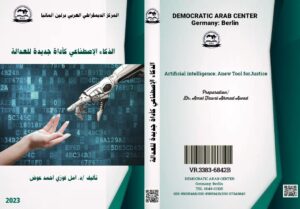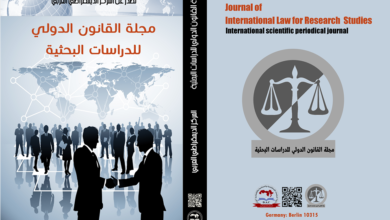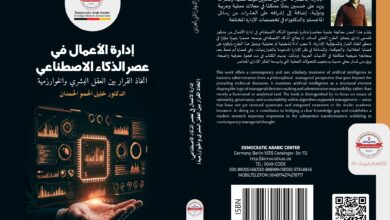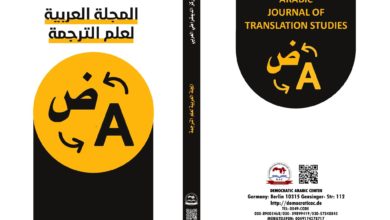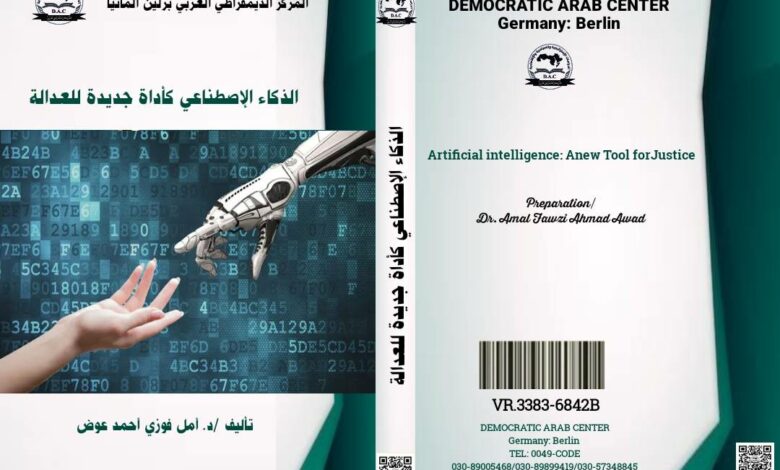
تأليف : د. امل فوزي احمد عوض – دكتوراه في القانون / كلية الحقوق / جامعة عين شمس – رئيس وحدة تكنولوجيا المعلومات – كلية التربية الفنية – جامعة حلوان
نسخة “pdf”-
الذكاء الإصطناعى كأداة جديدة للعدالة
الطبعة الأولى “2023″ –من كتاب: :- الذكاء الإصطناعى كأداة جديدة للعدالة
جميع حقوق الطبع محفوظة #المركز_الديمقراطي_العربي ولا يسمح بإعادة إصدار هذا الكتاب أو اي جزء منه أو تخزينه في نطاق إستعادة المعلومات أو نقله بأي شكل من الأشكال، دون إذن مسبق خطي من الناشر .
تقديم :-
الذكاء الاصطناعي هو في الغالب نظام للتعلم الذاتي وبالتالي يتطور باستمرار ، ولكن إذا تعلمت برامج الذكاء الاصطناعي بناء على وجهات نظر مضللة أو قرارات محكمة سابقة خاطئة ، فسوف تنعكس هذه الأخطاء المنهجية في قرارات الذكاء الاصطناعي المستقبلية ،وعلى سبيل المثال قد يعترف الذكاء الاصطناعي ، بمصداقية الشهود بناء على ميزات موضوعية مثل تعبيرات الوجه الدقيقة ، وبالتالي تكون أقل عرضة للاسترشاد بالانطباعات الذاتية ، ولكن – بصرف النظر عن إثارة مشكلات جديدة محتملة لحماية البيانات فإن التقييم للأدلة من قبل القاضي في الإجراءات المدنية له قيمة عالية واهمية كبيرة واثر بالغ على حسن سير العدالة وإذا نقل اختصاص اتخاذ القرارات القضائية بالكامل إلى الذكاء الاصطناعي، فإن الفردية اللازمة لاتخاذ قرار على أساس كل حالة على حدة ستفقد، وسيتوقف التطور القانوني وتختفي السوابق القضائية . فعلاوة على انه يجب اتخاذ أي قرار قضائي من قبل إنسان وليس روبوت وفي هذا السياق، يجب التركيز بشكل خاص على الدستور الذي يضمن استقلال القاضي فالذكاء الاصطناعي يربط البيانات ويتخذ القرارات بناء على الخوارزميات والاحتمالات لكن الخوارزميات التي تشغل الذكاء الاصطناعي تتم برمجتها من قبل المهندسين إذن من المسؤول عن قرارات الذكاء الاصطناعي؟ القاضي؟؟؟؟ ام المهندس؟؟؟؟؟ خاصة إذا لم يتم الكشف عن الخوارزمية ، فسيكون من الصعب أو المستحيل فهم أو التشكيك أو التحقق أو التحكم في قرار صادر عن الذكاء الاصطناعي فقط حتى لو كان القاضي يستخدم أداة الذكاء الاصطناعي بصفة داعمة ، فكيف يمكنه تقييم نتائج الذكاء الاصطناعي إذا لم يفهم كيف توصل البرنامج بمساعدة الذكاء الاصطناعي إلى قراره؟!!!!!! لذا تعد إحدى القضايا الأولية هي ما إذا كان برنامج الكمبيوتر أو العملية الآلية تمتلك السلطة القانونية لاتخاذ القرارات المعمول بها من قاض بشري ولكن كيف تكون ؟ ، ومن يمتلك السلطة القانونية لاتخاذ مثل هذا القرار هل هو مبرمج الكمبيوتر أم صانع السياسات أم صانع القرار البشري أم الكمبيوتر أو النظام الآلي نفسه؟
من المؤكد ان الذكاء الاصطناعي أكثر من مجرد تقنية قانونية وبالتالي ، فإن استخدام الذكاء الاصطناعي في القانون سيكون تطورًا لحظيا سريع جداااااااا وليس ثورة كما ان دمج الذكاء الاصطناعي في النظم القضائية ،ومهنة المحاماة عملية تجريبية حتى الآن ولكن فى نفس الوقت ذات تطور لحظى سريع ، لذا سيكون للمتبنين الأوائل ميزة كبيرة على النظم القضائية والهيئات والمؤسسات التي تأخرت في تبني التكنولوجيا. حيث سيترك القضاه والمحامون والهيئات والمؤسسات التي لم تشارك في التحول نحو الذكاء الاصطناعي في تأخر وسيقوم هؤلاء بدفع فاتورة التأخر من تواجدهم بساحة القانون من عدمه فى كل لحظة يتطور بها الروبوتات ، وفي النهاية سيتم تهجيرهم وللأبد من ساحة القانون ، فالذكاء الاصطناعي سيغير طريقة تفكيرالقضاه والمحامين معا بل وجميع المهتمين بالقانون ، والطريقة التي يمارسون بها أعمالهم والطريقة التي يتفاعلون بها مع قضاياهم ولكن كيف ذلك؟؟؟.
Preparation : Dr. Amal Fawzi Ahmad Awad – PHD in Law/Faculty of Law/Ain Shams UniversityHead of Information Technology Unit – Faculty of Technical Education – Helwan University
Abstract
AI is often a system of self-learning and therefore constantly evolving But if you learn AI software based on misleading views or erroneous previous court decisions, These systemic errors will be reflected in future AI decisions and, for example, AI may recognize witnesses’ credibility based on objective features such as accurate facial expressions, and are therefore less likely to be guided by subjective impressions, but – Apart from raising potential new data protection problems, the assessment of evidence by the judge in civil proceedings has high value and great importance and has a significant impact on the proper functioning of justice. If judicial decision-making is transferred entirely to artificial intelligence, the individuality necessary to make a decision on a case-by-case basis will be lost, legal development will cease and case law will disappear. Moreover, any judicial decision must be taken by a human being rather than a robot. In this context, special emphasis must be placed on the Constitution, which guarantees the independence of a judge. Artificial intelligence connects data and makes decisions based on algorithms and probabilities. But algorithms that operate artificial intelligence are programmed by engineers, so who is responsible for AI decisions? Judge?Or the engineer????? Especially if the algorithm is not detected, it will be difficult or impossible to understand, question, verify or control a decision made by AI only even if the judge uses the AI tool as a supporter, how can he assess the results of AI if he does not understand how the AI assisted software reached his decision?!!!!!! So, one of the primary issues is whether the computer software or automated process has the legal authority to make the applicable decisions from a human judge but how are they? and who has the legal authority to make such a decision is a computer programmer, policy maker, human decision maker, computer or automated system itself? AI is certainly more than just legal technology and therefore The use of AI in law would be a very rapid, instantaneous development, not a revolution, and the integration of AI into judicial systems, The legal profession has been experimental so far, but at the same time it is developing rapidly. So early adopters will have a great advantage over the judicial systems, bodies, and institutions that are late in adopting technology. Judges, lawyers, bodies, and institutions that have not been involved in the shift towards artificial intelligence will be left behind and they will pay the bill for delays in their presence in the arena of law if not at every moment that robots develop In the end, they will be displaced and forever from the arena of law. Artificial intelligence will change the way judges, lawyers and all those interested in law think. and the way they do business and the way they interact with their issues, but how?
الناشر: المركـز الديمقراطي العربي للدراسات الاستراتيجية والسياسية والاقتصادية – ألمانيا – برلين
Democratic Arabic Center- Berlin – Germany

